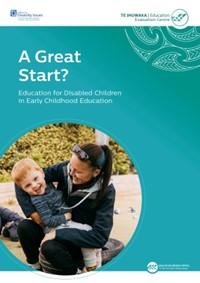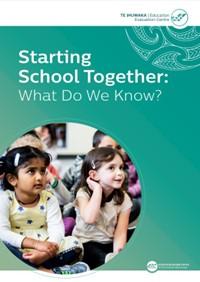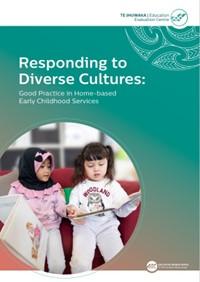Kia ora koutou
This newsletter is for our early childhood educators and is designed to keep you up-to-date with ERO's latest review approach, news and research.
Much has changed in Aotearoa New Zealand over the past few years. Our communities have been through a lot. We have been challenged by an unprecedented pandemic, and recent weather-related events have taken their toll on large parts of the North Island. I know that early childhood services have been particularly flexible and innovative, responding to the needs of your community. I would like to acknowledge you - the service owners, leaders, and teachers – who continue to provide excellent service to whānau and tamariki across the motu.
The way ERO reviews and evaluates early childhood services has also changed over the past few years. ERO's reviews focusing on regulatory standards and licensing criteria, called Akanuku | Assurance Reviews, were introduced in 2019. We then introduced our reviews that focus on service improvement, called Akarangi | Quality Evaluations, in late 2020 after constructive sector feedback.
The next step in our improvement programme is to develop an evaluation process that uses case studies that demonstrate excellence and innovation in early childhood services, which we will call Akamatua | Evaluating Excellence and Innovation.
In this newsletter, there's more about our approach to reviewing early childhood services and how you can prepare for an ERO visit.
Also in this edition, we explain our new approach to reviewing governing organisations; look at Child Protection Policies; get to know Lisa Oldridge, Manager, Review and Improvement Services, and put the spotlight on ERO research.
For more information, you will find everything you need on our website.

Why ERO reviews are important
New Zealanders expect that all early childhood services offer a safe environment with great education outcomes for all our little learners. To help communities have confidence in early childhood services, ERO undertakes reviews in all types of services and reports its findings publicly on our website.
ERO’s early childhood reviews are undertaken by evaluators / review officers who are experienced in the early childhood sector. Our team is strongly focused on continuous improvement that results in quality provision for children.
Here we explain how ERO reviews early childhood services.
Akanuku | Assurance Reviews focus on regulatory standards and licensing criteria.
An Akanuku | Assurance Review of your service is undertaken if:
- This is the first ERO review of the service.
- ERO previously identified the service as ‘not well placed’ or ‘requiring further development’.
- The service has moved from a provisional licence to a full licence.
- The service has been relicensed due to a change of ownership.
- ERO is undertaking a review and our reviewers find that an Akanuku | Assurance Review is needed.
- ERO decides with the service that an Akanuku | Assurance Review is appropriate.
The Akanuku | Assurance Review will confirm whether your service is meeting and maintaining licensing criteria. It will identify any compliance matters that you need to address.
The ERO website has information to help you prepare for an Akanuku | Assurance Review.
Your Akanuku | Assurance Review will assist you to be ready to move to an Akarangi | Quality Evaluation that focuses on improvement.
If we previously identified the service as ‘well placed’ or ‘very well placed’; or the service has previously completed a satisfactory Akanuku | Assurance Review and is meeting the regulatory standards, we undertake an Akarangi | Quality Evaluation.
These reviews evaluate the extent to which the early childhood service has the learning and organisational conditions to support equitable and excellent outcomes for learners.
In an Akarangi | Quality Evaluation we use our indicators and a judgement rubric to evaluate your service’s performance.
The ERO website has information to help you prepare for an Akarangi | Quality Evaluation.
This year, ERO will be developing a third evaluation process for the sector, Akamatua | Evaluating Excellence and Innovation. This is a case study approach. We will identify, investigate, and evaluate cases of excellence and innovation in early childhood services. We will explain this process fully in upcoming newsletters.
A new approach to reviewing governing organisations and their services
This year, ERO is introducing a new approach to reviews of governing organisations and their services. ERO has defined a governing organisation as an early childhood education provider that has oversight of 15 or more services. These can include services that are centre-based, home-based and those with mixed centre and home-based provision.
When ERO reviews governing organisations, we focus on what the governing organisation knows about its own services’ performance; the role the organisation plays in supporting each service’s continuous improvement journey; and evaluating the system-wide approaches that the governing organisation has in place.
ERO aims to build closer ties between review officers and governing organisations, and increase the contact ERO has with these organisations, relative to their size.
As part of the review, we will sample a number of the organisation’s individual services to be assured that the organisation’s policies, systems and practices are effectively implemented.
The governing organisation will receive a review report that includes information about the services sampled. This will be publicly available on ERO’s website.
Governing organisations can read more about how to prepare for a review on our website.
Getting to know ERO's Dr Lisa Oldridge

Tēnā koutou katoa
Ko Lisa Oldridge toku ingoa
Nō Whanganui-a-Tara ahau
Kei Te Arotake Matauranga ahau mahi ana.
I have been involved in early childhood education for over 25 years. My experience in early childhood includes being a teacher, head teacher, distance educator and lecturer.
I have been an ERO review officer since 2010, and recently became a manager. While at ERO, I have had the privilege to review a diverse range of early childhood services across the country. I have also had opportunities to be involved in both internal and external work. This includes contributing to a number of ERO’s national reports for early childhood and being seconded to the Ministry of Education Early Learning team to support the implementation of Te Whāriki, 2017.
I am based in ERO's Wellington office and lead a team of early childhood reviewers who are located across the country. This has led me to develop good skills in using Zoom! The work at ERO is diverse and requires an openness and commitment to ongoing learning. This is one of the many aspects that I particularly enjoy about working here.
I look forward to continuing to work with services across the country.
Comprehensive Child Protection Policies are vital
In December last year, the Government released Dame Karen Poutasi’s report on the Joint Review into the Children’s Sector: Identification and response to suspected abuse. Dame Karen details the lessons we can all learn from Malachi Subecz’s death in November 2021 and makes recommendations for changes and improvements across government agencies so that Malachi’s story is not repeated.
The report shows that the early childhood service Malachi attended noticed signs of abuse, but did not act in accordance with their own Child Protection Policy and report it.
ERO has made immediate changes to strengthen the way we evaluate child protection systems and processes in services. ERO’s review officers will ensure that Child Protection policies are explicit about mandatory reporting of suspected abuse and neglect, that the service has taken steps to ensure that staff have received sufficient training to understand their obligations, and that the service can demonstrate how the policy is being enacted.
We have purposely set the bar high. We want to ensure that all service personnel are aware of their obligations. These conversations are undertaken with every service that ERO reviews.
A child protection policy outlines how your service will:
- Work to keep children safe from abuse and neglect
- Identify, report, and respond to suspected or real cases of child abuse and neglect
- Your policy must be reviewed at least every three years.
Click here for more information and guidance about Child Protection Policy.
Spotlight on ERO research
Did you know that ERO has a research team that undertakes education system evaluations, effective practice reports, resources, and guides? These are produced by ERO’s Te Ihuwaka | Education Evaluation Centre and Te Pou Mataaho | Evaluation and Research Māori.
Here is some of our most recent research, relating to early childhood education:

Disabled learners in ECE
When disabled learners receive a quality, inclusive education they are more likely to achieve better outcomes, to complete secondary schooling and to go on to further study and employment.
This research looks at how well the education system is supporting disabled learners. It found that too many disabled learners are experiencing exclusion. We need to improve education for disabled learners so they can thrive.

Cohort entry, a guide for ECE services
Traditionally New Zealand children started school on their fifth birthday. Recently some schools have changed this to children starting school in scheduled groups. Our latest report on starting school has found that children starting school at the same time, called cohort entry, can have many benefits for children, whānau and schools.

Responding to diverse cultures
Aotearoa is more ethnically and culturally diverse than ever before, and a good education is not one-size-fits-all. Culturally responsive teaching affirms and builds on children’s cultures, identity, and languages to achieve successful learning outcomes. This work explores what culturally responsive teaching looks like in practice and how schools and services can support good practice.
For more information about ERO and our mahi please visit ero.govt.nz
To be added to our mailing list for this newsletter, please email us at ricomms@ero.govt.nz